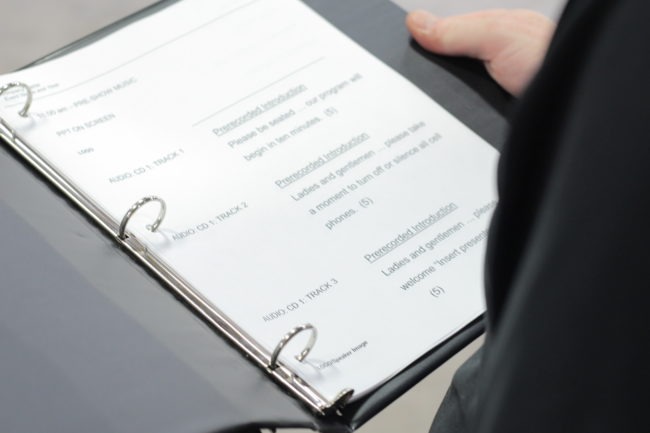)
Script writing 101 from Oklahoma’s most-experienced audio visual team
A script can make or break an event. Especially when talking about live events with presentations at the center of the event’s purpose, good scripting can guide the entire flow– from the audio visual partner behind the sound board to the waitstaff serving food.
The two must-have tools for a good event script include:
Run-of-show
- What is it? This document is typically a one page document outlining the times in which the event shifts. (Ie: awards, dinner courses, doors opening, etc.)
- Who should receive it? Anyone who can benefit from knowing shifts in the event like the banquet or catering manager, volunteers, security, and the production team.
- When should they receive it? No less than 2 weeks out. Having an idea of how the event will flow, can make other’s jobs much easier and save you a headache on the big day.
Production script
- What is it? This document is built from the run-of-show that includes spoken words, media file names, presenter names and intros, and more.
- Who should receive it? Your presenters should get the first draft followed by your audio visual production team.
- When should they receive it? Your final script should be in your audio visual team’s hands one week out from your event. If you will be using a teleprompter, it is best to send it earlier. It also helps to have many copies printed or in binders for the big day.

Production scripting
Writing an effective script is more than just capturing every detail of the event. A well-written script can help ensure an audience’s attention, eliminate event disruptions, and lead to less questions when it is time to begin. With 65 years of event planning experience, the team from Oklahoma’s oldest audio visual company Cory’s have these two tips:
- Especially if the event doesn’t have a serious tone, try to write your script in conversational language. If you are presenting on a serious, high-stakes topic, then more formal language applies. Scripts are easier to follow if they capture the voice of the presenter. If you’re unsure of their spoken voice attributes, then getting their input is key to ensuring they won’t slip up on the big day.
- Keep it as concise as possible. No audience wants to sit and listen to someone read a bio for five minutes or listen to a long-winded description of a sponsor’s company services. A good bio lasts a minute or less. The same applies to most company descriptions.
Let’s talk about formatting
One could argue that the format of the script is just as important as the spoken words in the script. The format of your script can keep your team organized and proactive, both on and off the stage. The best scripts have the following elements:
- Cues for the unspoken details– Whether doors are opening, dessert is being served, the audience needs a second to applaud, or your presenter needs to turn a page, listing these cues can save you from an awkward moment or a miscommunication among teams.
- Production cues– Production cues are what keep the audience glued to the stage or the message. These cues include which slides are up, what music to play, which logos to show, and when to play pre-recorded content such as, “take your seats.”
- Media file names– If your event presentation is packed with media files, keeping them organized is paramount to the success of the production team. Providing files with the same names that are listed in the script is a good start. An even better step to take is to provide a full list of the files on the first page of your script so that your production team can reference the list quickly.
- Color coding and font diversity– Colors are a simple way to decipher between roles or types of cues. For example, you can color code by presenter, by types of cues (spoken versus unspoken), windows of time, and more. The most common way to indicate the difference between production cues and spoken words is to use two very different fonts.
- Phonetic spelling– If your event’s presentation includes difficult last names or technical terms, including phonetic spelling can save some embarrassment on behalf of the presenter as well as the person of reference.
Our team has provided a scripting template below to help you get started.
With these things in mind, your event’s script can go from helpful to integral. An organized event team means an audience can see, hear, and feel your message.
Do you have an event coming up? Do you need scripting or production help? Cory’s is here to make your job easier and your event day smoother. Let’s talk about it!
Fill out the form to receive your FREE script template!
Want to learn more?
Want to learn more about how Cory's can help you with your next event or in-house project?
Contact Us
)
